|
|
|
Sort Order |
|
|
|
Items / Page
|
|
|
|
|
|
|
| Srl | Item |
| 1 |
ID:
140494
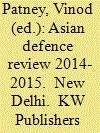

|
|
|
|
|
| Publication |
New Delhi, KW Publishers Pvt Ltd, 2015.
|
| Description |
vii, 240p.hbk
|
| Standard Number |
9789383649648
|
|
|
|
|
|
|
|
|
|
|
|
Copies: C:1/I:0,R:0,Q:0
Circulation
| Accession# | Call# | Current Location | Status | Policy | Location |
| 058273 | 355.03305/PAT 058273 | Main | On Shelf | General | |
|
|
|
|
| 2 |
ID:
166207
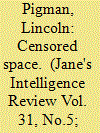

|
|
|
| 3 |
ID:
178778
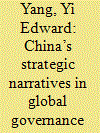

|
|
|
|
|
| Summary/Abstract |
Beijing has long sought to shape global narratives about China. The Xi Jinping administration not only continued that effort but also added an entirely new dimension: it now seeks to use discourse power, particularly through formulating and promoting strategic narratives, to reshape the international system itself. Drawing upon social identity theory (SIT) and strategic narratives framework, this study shows that Beijing employs a multifaceted narrative strategy to redefine existing norms or create new ones in varied global governance domains. A theoretical framework is presented to explain the strategy and subsequently applied to illustrate China’s strategic narratives at the international system level and in three global governance areas, i.e., climate change, human rights, and Internet governance.
|
|
|
|
|
|
|
|
|
|
|
|
|
|
|
|
| 4 |
ID:
133611
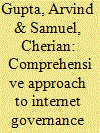

|
|
|
|
|
| Publication |
2014.
|
| Summary/Abstract |
The pressing issues around cyberspace revolve around internet governance, cybersecurity and drawing up rules of the road for the new domain of cyberwar. While each of these is at a different stage in its evolution cycle, cyberspace itself is facing a watershed moment as insecurities mount. The fragmentation of cyberspace seems inevitable unless there is accelerated movement on resolving the fundamental issues of internet governance and cybersecurity that have been hanging fire for well over a decade.
|
|
|
|
|
|
|
|
|
|
|
|
|
|
|
|
| 5 |
ID:
083370
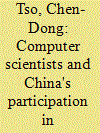

|
|
|
| 6 |
ID:
152047
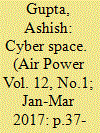

|
|
|
| 7 |
ID:
133610
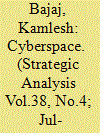

|
|
|
|
|
| Publication |
2014.
|
| Summary/Abstract |
Just as the world was beginning to understand the various dimensions of cyberspace in general, and internet governance in particular, it received the rude shock of the Snowden revelations about the global surveillance carried out by the United States National Security Agency (NSA) in the name of counterterrorism. All kinds of electronic communications of US citizens and non-citizens alike were monitored. Phone tapping and electronic interception were part of this huge operation to collect a haystack of data in the hope of detecting terrorist links to protect national security. The stories that are emerging from the NSA documents made available by Edward Snowden since June 2013 in the Guardian, the New York Times, Der Spiegel and the Washington Post continue to surprise, enrage or shame people depending upon the nation or group that they belong to. The whole world, including those who work for spy agencies, is surprised at the enormity of the scale of surveillance.
|
|
|
|
|
|
|
|
|
|
|
|
|
|
|
|
| 8 |
ID:
146540
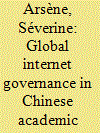

|
|
|
|
|
| Summary/Abstract |
This article explores the apparently ambivalent foundations of the notion of cybersovereignty as seen from China, through some of the most recent Chinese academic literature on global Internet governance. It shows that the sampled authors conceive of the current Internet order as an anarchic or disorderly space where global hegemons reproduce their domination over the world in the digital age. In the rather dichotomous world that this portrays, most of the authors concentrate their attention on the position and strategy of the United States, with a view to underlining the contradictions in American discourse through the PRISM scandal or the status of ICANN. In this context, most scholars studied here see the current situation, where Internet governance is increasingly debated, as an opportunity to rebalance the global Internet order and advance the strategic interests of China through the establishment of an intergovernmental Internet governance framework in the long term, and through active participation in the current status quo in the short term.
|
|
|
|
|
|
|
|
|
|
|
|
|
|
|
|
| 9 |
ID:
174826
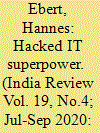

|
|
|
|
|
| Summary/Abstract |
Why has India developed into one of the world’s top targets and sources of cyber attacks despite possessing a strategic edge in information and communications technology (ICT)? India has one of the most competitive ICT industries and workforces, largest global sourcing and fastest growing e-commerce markets, and second largest and fastest growing internet user base, and is a leader in using ICT to provide governance services, yet its economic and political information infrastructures have been disproportionality affected by cyber attacks. This article traces the evolution of cyber threats to India’s national security and identifies drivers of the national and international policies the Indian state has adopted to address these threats in the past two decades. It finds evidence for a growing gap between the ideation and implementation of cyber security legislation and policy, which is rooted in the political constraints inherent in India’s state capacity-building efforts, reluctance to engage in multistakeholder coordination, and struggles to yield gains from its hedging diplomacy in global cyber security negotiations. For the Security Studies scholarship on the sources of cyber insecurity, these findings highlight the need to further study the links between different types of cyber capacity, state structure and political systems as well as the specific conditions under which quickly digitizing democracies can effectively translate their ICT capacities and regulations into greater cyber resilience.
|
|
|
|
|
|
|
|
|
|
|
|
|
|
|
|
| 10 |
ID:
137836
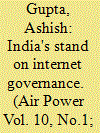

|
|
|
| 11 |
ID:
077062
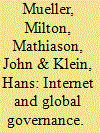

|
|
|
| 12 |
ID:
119481
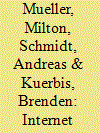

|
|
|
|
|
| Publication |
2013.
|
| Summary/Abstract |
This paper asks whether the Internet's heavy reliance on nonhierarchical, networked forms of governance is compatible with growing concerns about cyber-security from traditional state actors. Networked governance is defined as a semipermanent, voluntary negotiation system that allows interdependent actors to opt for collaboration or unilateral action in the absence of an overarching authority. Two case studies-Internet routing security and the response to a large-scale botnet known as Conficker-show the prevalence of networked governance on the Internet and provide insight into its strengths and limitations. The paper concludes that both cases raise doubts about the claim that introducing security concerns into Internet governance necessarily leads to more hierarchy and/or a greater role for governments.
|
|
|
|
|
|
|
|
|
|
|
|
|
|
|
|
| 13 |
ID:
133479
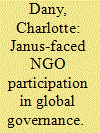

|
|
|
|
|
| Publication |
2014.
|
| Summary/Abstract |
Increasingly, nongovernmental organizations participate in negotiations within international organizations as well as in global working groups and discussion forums. This trend is commonly said to enable the influence of the participating NGOs. Yet this article highlights the negative effects of the high level of NGO participation on the NGOs' influence. It shows, in the case of the UN World Summit on the Information Society, how the NGOs' influence is reduced to less relevant issues and how this influence turns out to be highly selective: while the views and demands of a few NGO actors are successful, more diverse views from the broader NGO community become neglected. This suggests greater caution regarding the usual claim that more is necessarily better with regard to NGO participation in global governance.
|
|
|
|
|
|
|
|
|
|
|
|
|
|
|
|
| 14 |
ID:
186853
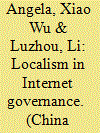

|
|
|
|
|
| Summary/Abstract |
Often analysing ‘the Chinese Internet’ as a national entity, existing research has overlooked China's provincially oriented web portals, which have supplied information and entertainment to substantial user populations. Through the lenses of the critical political economy of media and critical media industry studies, this article traces the ascendance of China's provincial web from the late 1990s to the early 2000s by analysing industry yearbooks, official reports, conference records, personal memoirs, archived webpages, and user traffic data. We uncover interactions between Internet service providers, legacy media organizations, commercial Internet companies, and the central and local governments – each driven by discrete economic interests, political concerns, and imaginaries about the new technology. Delineating the emergence and consolidation of China's provincial web, our study foregrounds the understudied political economy of online content regionalization at scale. Further, it sheds new light on Chinese media policy, Internet governance, and Internet histories, especially the widely noted conservative turn of online cultures after the mid-2010s.
|
|
|
|
|
|
|
|
|
|
|
|
|
|
|
|
| 15 |
ID:
119929
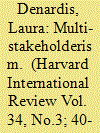

|
|
|
| 16 |
ID:
142671
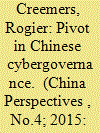

|
|
|
|
|
| Summary/Abstract |
During the first two years of the Xi administration, a series of successive measures were taken to restructure the way that the Chinese Internet is governed. New institutions were created to centralise governance over a sphere that had hitherto been fragmented, while the pursuit of ideological and technological security led to greater efforts to control the circulation of online information and prevent harm, particularly originating from foreign threats. This paper analyses this process, and discusses implications for the future of the Chinese and global Internet.
|
|
|
|
|
|
|
|
|
|
|
|
|
|
|
|
|
|
|
|
|